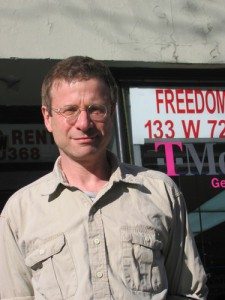Director’s Statement
 As I was completing a documentary about domestic violence in the US, and was searching for my next project, I began thinking about the West Bank, the issues raised by Israeli settlement expansion and also the impact of the Arab Spring on the conflict. I had never been to Israel or the West Bank before the summer of 2011, and I had no previous involvement with the Arab-Israeli conflict. Although I’m a secular Jew, I don’t have any known family in Israel or a background in Zionism. In August, 2011 I flew to Tel Aviv with my son, Ben, who had just turned 14. We traveled through the West Bank, to Palestinian villages, like Bet Ommar, and Israeli settlements, like Shiloh. I could see and feel a film on the way. The project was launched.
As I was completing a documentary about domestic violence in the US, and was searching for my next project, I began thinking about the West Bank, the issues raised by Israeli settlement expansion and also the impact of the Arab Spring on the conflict. I had never been to Israel or the West Bank before the summer of 2011, and I had no previous involvement with the Arab-Israeli conflict. Although I’m a secular Jew, I don’t have any known family in Israel or a background in Zionism. In August, 2011 I flew to Tel Aviv with my son, Ben, who had just turned 14. We traveled through the West Bank, to Palestinian villages, like Bet Ommar, and Israeli settlements, like Shiloh. I could see and feel a film on the way. The project was launched.
Why another film relating to the Arab-Israeli conflict? There have been lots of other films, many of them great. That includes “The Gatekeepers” and “5 Broken Cameras,” both nominated for Oscars in 2012. When I saw those two films, I was strongly encouraged: “Holy Land” doesn’t repeat the work; it adds to it in very substantial ways.
I hope this film can reach a wider audience than previous films about the conflict. I wanted to avoid preaching to the converted. We sought to find a balanced and representative group of West Bank characters — even though to perfectly accomplish that is impossible, even though it is inevitable that we’ll be criticized from all sides.
We filmed from fall, 2011 through 2012, spending a roughly equal amount of time in Palestinian villages and Israeli settlements. We go beyond sound bites and propaganda to explore a divided landscape where religion, nationality, action and resistance affect the lived realities of both Israelis and Palestinians.
Our subjects all engage in stories of struggle, dedicated to making a difference for their families and communities. Our characters are articulate and self aware, and have given us complete access to almost all aspects of their lives.
Other Titles from Hillcrest Films
For more on Peter Cohn and his films, please go to petercohn.com.
POWER AND CONTROL: DOMESTIC VIOLENCE IN AMERICA. An exploration of the shocking persistence of gender violence, the film follows Kim, a Dulth, MN mother of three as she makes her way through a domestic violence shelter. The complex issues around domestic violence, and the history of the influential Duluth Model, are refracted through Kim’s determined quest for a new life. “Equally a useful primer on aspects of domestic violence and a purely harrowing story (with a walloping twist), “Power and Control” is highly recommended (Rob Nelson, Minnesota Post).”
GOLDEN VENTURE. The film chronicles the ongoing struggles of passengers who were aboard the Golden Venture, an immigrant smuggling ship that ran aground near New York City in 1993 with 285 undocumented Chinese immigrants huddled below deck. “A compelling and timely portrait of human courage, resilience, and compassion, set against a backdrop of bigotry, fear, and political infighting, this is recommended (F. Swietek, Video Librarian).”
DRUNKS. For this groundbreaking 1996 production, an Oscar winner, two Oscar nominees and group of highly regarded major film actors gathered in a church basement in New York City to portray a group of alcoholics at an AA meeting. The stars include Richard Lewis (in his first dramatic lead), Faye Dunaway, Dianne Wiest, Parker Posey. “Drunks” also features the late Spalding Gray and Howard Rollins. “A cantata of the damned, some of whom have decided to save themselves. In this gravity, there is also grace. (John Leonard, New York Magazine).”






